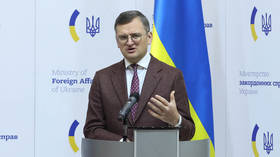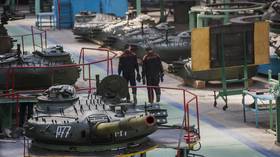Western Europe ‘doesn’t know how to fight’ – Ukrainian FM

Western Europe isn’t producing enough weapons and ammunition to supply either Kiev or itself, Ukrainian Foreign Ministry Dmitry Kuleba said in an interview on Thursday, lamenting Russia’s industrial advantage.
In an interview with the Kiev Independent, Kuleba expressed hope that Ukraine will eventually get more money, weapons, ammunition and equipment from the US and its allies, but was skeptical about their ability to expand their military production.
“Europe doesn’t know how to fight wars. The production of weapons is not the most popular area of business,” he told the outlet. “Unfortunately, our friends spent too much time deliberating on how and when to ramp up their production of weapons and ammunition.”
The EU has sent Kiev at least €27 billion ($29.88 billion) since Russia launched its military operation in the neighboring state in February 2022, with the US contributing over $44 billion worth of weapons, equipment, and ammunition to replenish Ukraine’s combat losses. In recent months, however, they have fallen short of promised deliveries of artillery shells and rockets.
“I’m more concerned with the pace of development of defense industries than with the arrival of new types of weapons,” Kuleba told the Kiev Independent.
“Europe clearly has an advantage in its technology. The problem and challenge they face is scaling up that technology’s production. I regret to say it, but this will not be enough if the situation doesn’t change. And Russia will be ahead of us,” he added.
Kuleba grudgingly admitted that Russia has cranked its military industry into high gear, despite Western sanctions. He criticized the West for “protectionism,” which he said was hampering military production.
“The solution is to create a certain level of alignment of all defense industries of the EU, the United States, and like-minded countries. For them to work as one whole system,” he said, but acknowledged that this was difficult due to intellectual property and security concerns.
US weapons manufacturers have frequently undercut Western European industries in the world market, even though their systems were supposed to be “interoperable” under NATO standards.
Facing opposition in Congress, the White House has tried to pitch more aid to Ukraine as part of a program to help the US defense industry and create jobs, but to little effect. Washington has also pushed for rebuilding the military industry in Ukraine itself, though the threat of Russian missile and drone strikes makes it a dubious proposition.
In October, as NATO stockpiles of ammunition began to run dry, Ukrainian Strategic Industries Minister Aleksandr Kamyshin lamented that “all the worldwide capacities” for the production of weapons and ammunition would “not be enough” for Ukraine’s warfighting needs.













